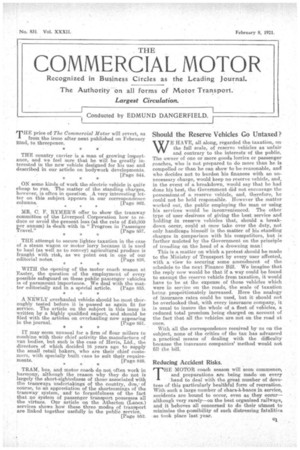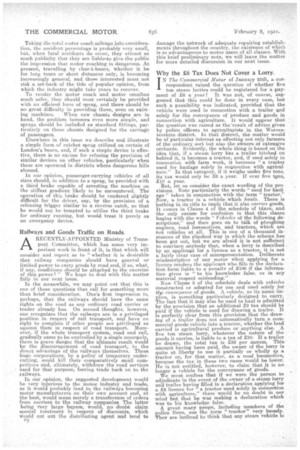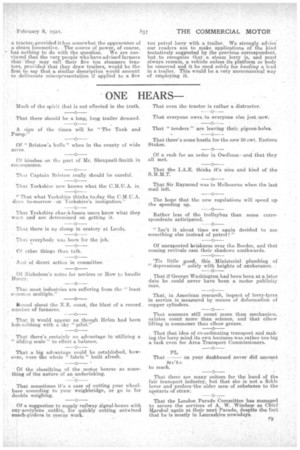T HE price of The Commercial Motor will revert, as from the issue after next published on February 22nd, to threepence.
Page 1

Page 2

Page 3

If you've noticed an error in this article please click here to report it so we can fix it.
THE country carrier is a man of growing importance, and we feel sure that he will be greatly interested in the new vehicle designed! for his use and described in our article on bodywork developments.
[Page 844.
ON some kinds of work the electric vehicle is quite cheap to run. The matter of the standing charges, however, is often in question. A very interesting letter on this subject appears in our correspondence
columns. [Page 862. • MR. Cl. F. RYMER'S offer to show the tramway committee of the Liverpool Corporation how to reduce or avoid the present loss (at the rate of £40,000 per annum) is dealt with in " Progreso in Passenger Travel." [Page 857.
THE attempt to secure lighter taxation in the case of a steam wagon or motor lorry because it is used to haul (as well as to convey) agricultural produce is fraught with risk, as we point out in one of our
editorial notes. [Page 836.
WITH the opening of the motor coach season at Easter, the question of the employment of every possible safeguard on these public passenger vehicles is of paramount importance. We deal with the mat ter editorially and in a special article. (Page 855.
A NEWLY overhauled vehicle should be most thoroughly tested before it is passed as again fit for service. The article on the subject in this issue is written by a highly qualified expert, and should he filed with the articles on overhauling now appearing
in the journal. (Page 851.
IT may seem unusual for a firm of flour millers to combine with their chief activity the manufacture of van bodies, but such is the case of Hovis, Ltd., the directors of which decided 16 years ago to Supply the small retail bakers, who are their chief customers, with specially built vans to silit their require ments. [Page 840.
TRAM, bus, and motor coach do not often work in harmony, although the reason why they do not is largely the short-sightedness of those associated with the tramways undertakings! of the, country, dire,. of course, to an appreciation of the shortcomings of the tramway system, and to -forgetftilness of the fact that no system of passenger transport possesses all the virtues. Our article on the Atherton (Lancs.) services shows how these three modes of transport are linked together usefully in the public service.
(Page 852.
Should the Reserve Vehicles Go Untaxed ?
W.E. HAVE, all along, regarded the taxation' on the full Scale, of reserve vehicles as unfair and contrary to the interests of the public. The owner of one or more goods lorries or passenger poaches, who is not prepared to do mare than he is compelled or than he can show to be-reasonable, and who decides not to burden his finances with an unnecessary charge, would keep no reserve vehicle, and, in the event of a breakdown, would say that he had done his hest, the Government did not encourage the possessiontof a reserve vehicle, and, therefore, he could not be held responsible. However the matter worked out, the public employing the man or .using his services would be inconvenienced. The other type of user desirous of giving the best service and holding in reserve vehicles that, should a breakdown occur, could at once take over the duty, not only handicaps himself in the matter of his standing charges in comparison with his competitors, but is 'further mulcted by the Government on the principle of treading on the head of a drowning man!
This is a matter on which a protest should be made to the Ministry of Transport by every user affected, with a view to securing some amendment of the schedule to the next Finance Bill. We! imagine that the reply now would be that if a way could be found to exempt the reserve vehicle from taxation, it would have to be at the expense of those vehicles which were in service on the roads., the scale of taxation being. proportionately increased. Here the analogy of insurance rates could be used, but it should not be overlooked that, with every insurance company, it is usual to insure the whole of a fleet of vehicles, a reduced total premium being charged on account of the fact that all the vehicles are not on the road at once.
With all the correspondence received by us on the subject, none of the critics of the tax has advanced a practical means of dealing with the difficulty because the insurance companies' method would not fill the bill.
Reducing Accident Risks.
THE MOTOR coach season will soon commence, and preparations are being made on every hand to deal with the great number of devotees of this particularly healthful form of recreation. With such a large number of chars-h-ha.ncs in service, accidents are bound to occur, even as they occur— although Very rarely—on the best organized railways, and it behoves all concerned to do their utmost to minimize the possibility of such distressing fatalities
as took place last year. Taking the total motor coach mileage into consideration, the accident percentage is probably very small, but, when fatal accidents do occur, they attract so much publicity that they are liablego give the public the impression that motor coaching is dangerous. At present, travelling by char-A.-banes, Whether it be for long tours or short. distances only, is becoming increasingly general, and those interested must. not risk a set-back of the tide of popular opinion, from which the industry might take years to recover. To render the motor coach and motor omnibus much safer, they should most certainly be provided with an efficient form of sprag., and there should be no great difficulty in providing these, even on exist ing machines. When new chassis designs are in hand, the problem becomes even more simple, and sprags should be included as standard fittings, particularly on those chassis designed for the carriage of passengers.
Elsewhere in this issue we describe and illustrate a simple form of ratchet sprag utilized on certain of London's buses, and, if such a simple device is effective, there is no excuse for refusing the provision of similar devices on other vehicles, particularly when these are operated in districts where dangerous hills abound.
In our opinion, passenger-carrying vehicles of all sizes should, in addition to a prag, be provided with a third brake capable of arresting the machine on the stiffest gradient likely to be encountered. The operation of this brake should be rendered slightly difficult for the driver, say, by the provision of a releasing trigger similar to a reverse catch, so that he would not be tempted to utilize the third brake for ordinary running, but would treat it purely as an emergency device.
Railways and Goods Traffic on Roads.
ARECENTLY-APPOINTED Ministry of Transport Committee, which has some very important work in front of it, is that which will consider and report as to "whether it is desirable that railway companies should have general or limited power to carry goods by road and, if so, what, if any, conditions should be attached to the exercise of this power?" We hope to deal with this matter fully in our next issue. In the meanwhile, we may point out that this is one of those questions that call for something more than brief consideration. One's first impression is, perhaps, that the railways should have the same rights on the road as any ordinary road carrier or trader already has. On second thoughts, however, one recognizes that the railways are in a privileged position in respect of rail transport, and have no right to complain, if other people are privileged, as against them in respect of road transport. Moreover, if the whole transport system, road and rail, gradually came to be controlled by a single monopoly., there is grave danger that the ultimate result would be the discouragement of road transport, to the direct advantage of the railways themselves. These huge .corporations, by a policy of temporary undercutting, could kill their comparatively small competitors and, ultimately, withdraw the road services -used for that purpose, forcing trade back on to the railways. . In our opinion, the suggested development would be very injurious to the motor industry and trade, as it would probably lead to the railways becoming motor manufacturers on their own account and at the best, would mean merely a transference of orders from carriera to The railway companies. The latter being v!ery large buyers, would, no doubt claim special treatment in respect of discounts' which would cut out the distributing agent and tend to e<2 damage the network of adequate repairing establishments throughout the country, the existence of which is so advantageous to motor users of all classes. With this brief preliminary note, we will leave the matter for more detailed discussion in our next issue.
Why the £6 Tax Does-Not Cover a Lorry.
IN The Commercial Motor of January 25th, a, correspondent raised the question of whether five ton steam _lorries could be registered for a payment of 26 a year? It was not, of course, sug gested that this could be done in every case, but such a possibility was indicated, provided that the vehicle were used in connection with a trailer and solely for the conveyance of produce and goods in connection with agriculture. It would appear that the question was raised as the-result of advice given by police officers to agriculturists in the Worcestershire district. In that district, the matter would be of particular interest as affecting not only farmers of the ordinary sort but also the owners of extensive orchards. Evidently, the whole thing is based on the idea that, if a steam lorry has a trailer hitched on behind it, it becomes a tractor, and, if used solely in eonnectioa with farm work, it becomes " a tractor used for haulage solely in connection with agriculture." In that category, if it weighs under five tons, its tax would only be 26 a year. If over five tens, 210 a year. , But, let us consider the exact wording of the provisions. Note particularly the words " used for haul age " taken in conjunction with the term "tractor! Now, a tractor is a vehicle -which hauls. There is nothing in its title to imply that it also carries goods. It comes in Clause 4 of the schedule of taxes and the only excuse for confusion is that this 'clause begins with the words " Vehicles of the following de scriptions," and then goes on to talk of ploughing engines, road locomotives, and tractors, which are not vehicles at all. This is one of a thousand in stances of the slipshod way in which the scheme has been got out, but we are afraid it is not sufficient to convince anybody that, when a lorry is described-. by an applicant for a licence as a tractor, it is not a fairly clear case of misrepresentation. Deliberate misdeseription of any motor when applying for a licence renders the applicant who fills in the declaration form, liable to a nenaltv of 2100 if the information given is " to his knowledge false, or in any material respect misleading." Now Clause 5 of the schedule deals with vehicle-8 constructed or adapted for use and used solely foe tho conveyance of goods. A-vehicle, as ita name implies, is something particularly designed to carry. The fact that it may also be used to. haul is admitted by the provision that an additional 22 tax should be paid if the vehicle is used for drawing a trailer. Itis perfectly clear from this provision that the draw ing of a trailer does not automatically turn a commercial goods vehicle into a tractor, whether the load carried is agricultural produce er anything else. A five ton steam lorry, whatever the nature of thegoods it carries, is liable to a tax of 2311 If a trailer be drawn, the total tax is 232 per annum. Thisamount having been paid, the owner of the lorry is quite at liberty to use it partially or wholly as a tractor or, for that matter, as a road loconnetive, because the tax in these two oases would be lower. He is not entitled, however, to claim that it is no longer a vehicle for the conveyance of gods. We must confess that if we were the person to adjudicate in the event of the owner of a, steam lorry and trailer having filled in a declaration applying for a 26 licence for "a tractor used soldy in connection with agriculture," there would be no doubt in our mind but that he was making a declaration which was to his knowledge false. . A great many peope, including members of the police force, use the term "tractor" very loosely. 'Mier are inclined to think that any steam vehicle ie a tractor, provided it has somewhat the appearance of a steam locomotive. The source of power, of course,
• has nothing to do with the question. We are convinced that the verypeople who have advised farmers that they may call their five ton steamers tractors, provided that they draw trailers, would be the first.to say that a similar description would amount to deliberate misrepresentation if applied to a five ton petrol lorry with a trailer. We strongly advise our readers not to make applications of the kind tentatively suggested by the previous correspondent, hut to recognize that a steam lorry is, and must always remain, a vehicle unless its platform, or body he removed and it be used solely for hauling a lead in. a trailer. This would be a very uneconomical way of employing it.






























